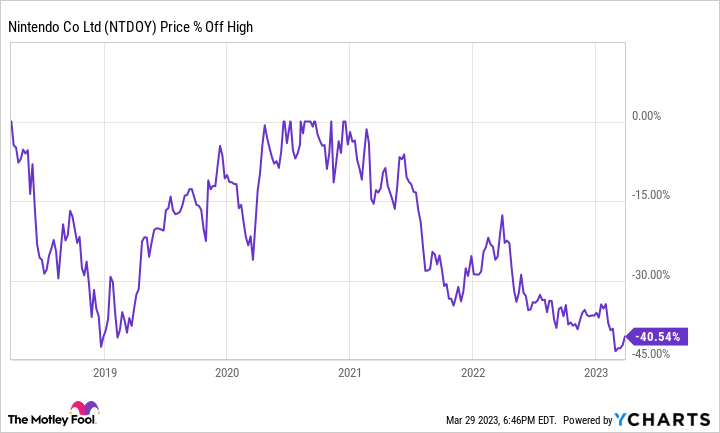As with many stocks, the last two years have been tough on Nintendo (NTDOY 0.62%). Shares are down 41% from their all-time high due to investor concerns over stagnating console sales, declining profitability, and foreign exchange headwinds between the Japanese yen and the U.S. dollar. While Wall Street may be focused on the next quarter or year, drawdowns like these can provide individual investors with longer time horizons a cheap starting price when building out their portfolios.
Right now, I think Wall Street is missing the forest through the trees with a high-quality business like Nintendo. Here’s why it is the one video game stock I’ll never sell from my portfolio.
NTDOY data by YCharts
Diversified set of entertainment characters
The core reason Nintendo goes into my “never sell” bucket is its top-tier list of entertainment characters. From Mario to Donkey Kong to Zelda to Metroid to Pokémon, Nintendo’s first-party intellectual property is unrivaled across the video game sector, with only Disney on the same playing field across the wider entertainment sector.
Nintendo’s main strategy is to distribute its first-party games on its own gaming hardware. This gives it full control and vertical distribution for its entertainment franchises, leading to strong financial results as long as it can build games that people want to buy. On its newest Nintendo Switch hardware it has done quite well with this. For example, its games like Mario Odyssey, The Legend of Zelda: Breath of the Wild, and Pokémon Scarlet/Violet have sold over 20 million copies each. Meanwhile, Mario Kart 8 has sold a whopping 52 million copies on the Nintendo Switch, bringing in tons of high-margin revenue for the company.
Management at Nintendo can get a bit wonky when designing game hardware (I’m looking at you, Wii), but it has shown over the last few decades to have a unique skill set in building games and entertainment characters that people of all ages cherish. I have little doubt it can continue with this strategy over the next few decades as well.
Expansion into other entertainment categories
Over the last five years, Nintendo’s management has started to make some major investments to bring its entertainment characters outside of video games. The two main ways it is doing so are through movies and theme parks.
The Super Mario Bros. Movie debuts in theaters around the globe next week in partnership with Illumination Entertainment. Trailers for the film look excellent, and it will likely draw tens of millions of Mario fans to theaters over the next few months. It’s not yet clear if other movies are in the works, but with Illumination’s founder and CEO Chris Meledandri joining the Nintendo board of directors, I doubt it is going to end with just one release.
Nintendo has partnered with Universal to build four theme parks around the globe in Japan, Singapore, California, and Florida. The California and Japan locations are open today. While tiny compared to competitor Disney World, there have been heavy crowds at these parks ever since they’ve opened, as families bring their kids to see the cast of Mario characters in real life.
The financial impact of these movie and theme park initiatives over the long term is unclear. However, even if it doesn’t move the needle directly for Nintendo, I think these other entertainment pillars can deepen fan engagement and drive more people to spend money on Nintendo video games, which is already a cash cow for Nintendo.
Nintendo has a conservative balance sheet
As a Japanese company, Nintendo runs with a conservative balance sheet. At the end of last quarter, it had over $13 billion (USD) in cash and zero debt. Compared to a market cap of $45.2 billion, that means roughly 29% of the stock you are buying today is pure cash Nintendo can return to shareholders. Over the last 12 months, it has paid $0.374 in dividends per share. With the U.S. shares currently trading around $9.60, that is a trailing dividend yield of close to 4%.
NTDOY Operating Income (TTM) data by YCharts
And with the company generating billions of dollars in profits annually ($4 billion over the last 12 months), Nintendo has plenty of room to raise these dividend payouts over the long term. Whether you plan to reinvest the proceeds or not, this will create a consistent income stream for investors who plan to hold their shares of Nintendo for many years into the future.
